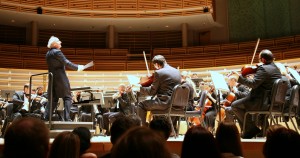
For MISO conductor, new music is vital to the project
Eduardo Marturet uses a computer metaphor when he talks about the impact of new music on listeners.
“I love to give you music, that when you come in and sit in your chair, and you’ve come in from your work and you’re tired or whatever, it’s music that really shakes you,” he said. “I usually try to do this at the beginning of the program, because that somehow erases your RAM memory. It puts you right on the edge of your seat.
“And then the contrast with the normal music: If you do Mozart, for example, Mozart sounds totally different, because your RAM memories have been erased.”
The director of the Miami Symphony Orchestra is a big believer in the importance of freshening an ensemble’s repertoire with contemporary music. As he points out, his group works with no less than three composers in residence: Alexander Berti, Samuel Hyken and Carlos Rafael Rivera.
MISO is one of 57 finalists for a Knight Arts challenge grant, which the orchestra wants to use to “help develop South Florida’s musical voice and infuse the symphonic repertoire with new energy by commissioning new works through a composer-in-residence program.”
A native of Venezuela who has enjoyed a strong international conducting career, Marturet, 59, has been director of the MISO since 2006, and his current contract runs through the 2016-17 season. He’s steadily added concerts to the orchestra’s presentations and pursued a management model that develops the supervisory talent of his players, such as concertmaster Daniel Andai.
Andai, in fact, will be center stage next April, when the orchestra performs a special concert at the Knight Concert Hall for King Juan Carlos I of Spain and Queen Sophia to mark the 500th anniversary of Juan Ponce de Leon’s landing on these shores, likely in what is now St. Augustine.
Hyken, the MISO’s principal trumpeter, debuted his Beatles Guide to the Orchestra last October with the group, and Marturet said he’s taken it to Caracas, where it’s been very successful. Hyken will write a piece for Andai and the orchestra based on Spanish Sephardic songs.
“They are amazingly beautiful,” Marturet said.
And they communicate directly, which is something that’s important to Marturet. Cutting-edge classical music of much of the previous century was often considered inaccessible and overly difficult thanks to its atonal language, derived from experimentations advanced by the Second Viennese School of composers in the century’s first years.
Today’s composers are not writing in that same kind of environment, and it may be that history will see the current period as the era of musical crossover, when genre barriers came down everywhere and composers were tasked with finding new communicative languages. But there’s still the threat of alienating audiences, Marturet said.
“I’m a composer myself, and I’m always worried about the language which we use to write music. Sometimes it can be extremely presumptuous and intellectual. It’s like we’re alone in our ivory tower and we don’t care to communicate, and that’s the biggest mistake any composer can do,” he said. “To me, it’s key to connect with people, for them to have fun with the music.”
MISO’s concerts for the 2012-13 season include several directly communicative programs, including a concert of film scores Dec. 15 and 16, an evening of Viennese light music for the new year on Jan. 20, and an American-music concert April 20 featuring harmonica soloist Corky Siegel in William Russo’s Street Music.
January’s “Ocean Drive in Vienna” concerts will involve the three composers, and Marturet said the music will have a Miami twist, suggesting listeners might be able to hear Johann Strauss II’s Emperor Waltz “done in a merengue rhythm,” he said.
“The benefit of that project is that these composers can rent the music out to other orchestras around the country that are really in need of fresh repertoire, especially for pop concerts,” he said.
These are the sorts of concerts that Marturet likes to use to draw in new audiences to the work of the orchestra. He knows when he’s succeeding if he hears applause in the middle of a multi-movement work such as a symphony.
“They’ll clap in the middle of the movements, which people hate, and I love. Because when someone claps in the middle of the movements, it means there’s a newcomer there,” he said.
Winners of the arts challenge will be announced in December. In the meantime, Marturet will be looking for ways to make sure fresh music keeps his enterprise engaging and relevant.
“I’ve done that all my life as a conductor, because I believe that we must have music from the present, and I also believe that the orchestra’s duty is to stimulate the listener who comes to a concert, to show them that there is a different world there, different than the musical world they’re in,” he said.
The Miami Symphony Orchestra’s website is www.themiso.org.
Recent Content
-
Artsarticle ·
-
Artsarticle ·
-
Artsarticle ·

